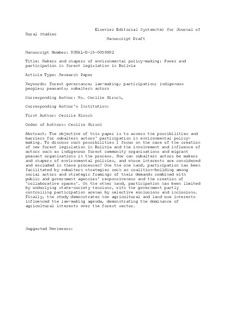Makers and shapers of environmental policy making: Power and participation in forest legislation in Bolivia
Journal article, Peer reviewed
Accepted version
Permanent lenke
http://hdl.handle.net/11250/2578516Utgivelsesdato
2017Metadata
Vis full innførselSamlinger
Sammendrag
The objective of this paper is to assess the possibilities and barriers for subaltern actors' participation in environmental policy making. To discuss this issue I focus on the case of the creation of new forest legislation in Bolivia and the involvement and influence of actors such as indigenous forest community organisations and migrant peasant organisations in the process. How can subaltern actors be makers and shapers of environmental policies, and whose interests and demands are considered, included and excluded in these processes? The case study demonstrates that on the one hand, participation has been made possible and facilitated by subaltern strategies such as coalition building among different actors and strategic framings of their demands, combined with public and government agencies' responsiveness and the creation of 'collaborative spaces'. On the other hand, participation has been limited by fragmented processes for inputs, selective inclusions and exclusions of actors and underlying state-society tensions. Finally, the study illustrates how agricultural and land-use interests have influenced the law-making agenda and the development of recent policies affecting forest areas.

